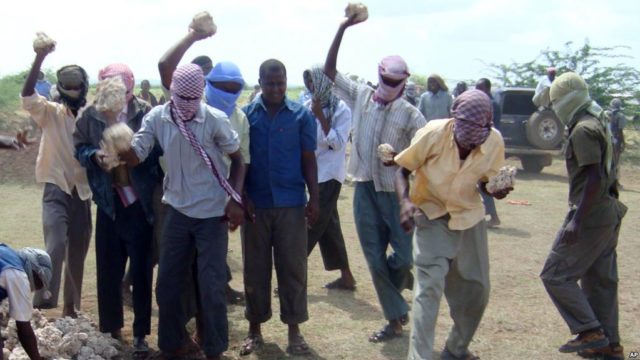
In the last 4 years, federal system of government has taken root in Somalia with the formation of two layers of government; the Federal government of Somalia (FGS) and the governments of Federal Member States (FMS) through painstaking political negotiations and compromises. Due to the incompleteness of the provisional Federal constitution, the division of responsibility as well as sharing of power and resources between FGS and FMS have not been finally negotiated and settled.
News of new political crisis is emerging as FGS and FMS are at loggerheads over alleged attempts by the leaders of the Federal government to undercut the authority of the Federal Member States and usurp power in order to unilaterally chart the security, political and economic policies of the nation.
This projected showdown will play out in the coming months in various forums between the FGS and FMS to settle the remaining political issues of the nation including the completion of the provisional constitutional review, agreeing on the electoral model for 2020, implementing the security sector architecture and negotiating on power, revenue and resource sharing.
The simmering dissention between the two levels of government brings back the atmosphere of mistrust and suspicion. It bodes disaster for the future collaboration between the leaders and sets the country back years of hard-fought security and political gains.
President Mohamed Abdullahi Farmajo and Prime Minister Hassan Ali Khayre of FGS are both accused of demagoguery, absolutism, unruly behaviours to destabilise Federal Member States and insidious revenge campaigns to unseat some of the presidents of the Federal Member States.
The President’s Chief of Staff, Mr Fahad Yasin, is branded as a ruthless éminences grise behind the President, wielding enormous influence and far reaching powers. He is well-known for his hate-filled rhetoric against Puntland and his bitter opposition to the country’s federal system of government. Reports allege that Mr Fahad, with his unorthodox modus operandi of bribery and promises, is involved in these plots.
A campaign to oppose and oust President Ahmed Mohamed Islaan (Madoobe) of Jubbaland has begun in earnest in Mogadishu in the last few weeks. A group calling themselves Jubbaland Democracy Restoration Council (JDRC), led by former FGS information minister Mr. Abdullahi Iilmooge Hersi has been announced in Mogadishu on 5 May 2018. The members of the group, who mainly hail from Jubbaland, received a strong backing from the Federal government of Somalia and have already issued a number of condemnatory press releases against Mr Madoobe’s Jubbaland administration.
President Ahmed Madoobe held a press conference in Kismayo on 7 May 2018, pronouncing very strong but constructive criticism towards the Federal government. While articulating his thoughts and position on the security and political situation of the country, Mr Madoobe used the occasion as a shot across the bow, a pre-emptive warning against anticipated interference of the Federal government in Jubbaland local politics.
Sources in Villa Somalia confirm meetings and telephone communications between the JDRC campaign leaders and officials from the Federal government, allegations that both President Farmajo and Prime Minister Kheyre vehemently support efforts to replace President Ahmed Madoobe.
Other sources in Mogadishu confirm that some senior FGS officials were briefed about strategies to curtail the activities of Federal Member States, namely Puntland and Jubbaland. It is reported that both Puntland and Jubbaland are the targets at this juncture because of their perceived ideological and political alliance as well as their jurisdictional and financial independence from Mogadishu.
Puntland Mirror has received credible reports that the Federal government plans to use the ongoing constitutional review process to claw back most of the powers of the Federal Member States. The reports state that the exclusive powers of the Federal government were increased to 25 absolute constitutional mandates. This is a worrying development, one that removes the checks and balances on the Federal government and the importance of inclusive politics, consultations, power sharing and inclusive ownership of the destiny of the nation. Such move gives the leaders of the Federal government unfettered authority to use and abuse power. It diminishes the value and effectiveness of our Federal system and puts the country back on the brink of dictatorship and civil war. It destroys the aspirations of many Somali people whose dream of devolving power close to the masses is only guaranteed under the Federal structure.
Our sources paint a bleak picture of the future direction of the nation and the fear of return of the crippling political crisis in the coming months. A Federal government official, who asked for anonymity, accused the senior officials of the Federal government of planning unscrupulous and dangerous ploys to create chaotic political upheavals and subversion in Jubbaland. Our source confided that “the Federal government is hell-bent on the initiation of waves of political unrest to weaken Federal Member States, particularly Jubbaland. They are going to support individuals from Mr Madoobe’s sub-clan to divide his power base and ultimately topple him. They will use every form of government patronage for their cause”.
There are rumours in Mogadishu that the Federal government is providing financial assistance to JDRC to organize further opposition gatherings in Nairobi, Gedo region and finally in Kismayo. It is unclear whether the Federal government of Somalia has sought support from Kenyan and Ethiopian governments for its plans.
One of the Federal government’s activities causing the greatest concern is their alleged plans to use Somali National Army (SNA) in Jubbaland to weaken the State authority and stage revolt against Ahmed Madoobe.
The Federal government’s attempt to sidestep Jubbaland State authorities and deal with the regional officers in Gedo region is also seen another sign of the deepening friction with Jubbaland. The Federal government is said to have adapted similar tactics to instigate dissent and the loss of trust in the recent peace agreement between Ahlu Sunna WalJama’a and Galmudug administration in Galmudug State.
There is also the poisonous “Mogadishu anarchy”. The city is very notorious for hosting and harbouring subversive groups, terrorists, renegades and criminal fugitives. In the last 20 years it became a place where anyone conspiring to create chaos and carnage in other parts of the country is welcomed. To claim its status as the nation’s capital and garner respect, the city has to shed its horrible image as a “sanctuary for insurgents, anarchists and spoilers”.
The news of the impending political crisis and the Federal government’s subversive activities is causing alarm in major cities in Federal Member States. In Garowe, people are braced for the defence of Jubbaland State and call for close cooperation and unity between FMS to thwart any illegal and destructive meddling from the Federal government.
Unlike Puntland people who rally around their leaders against outside interference, Jubbaland people fall victim to divisions, disruptive outside influence and popular disingenuous nationalism all organized and financed from Mogadishu. Jubbaland people have enjoyed peace, security, good governance, justice and economic growth in the last 4 years under President Ahmed Madoobe. Time will tell whether Jubbaland people can break away from the cycle of crisis orchestrated in Mogadishu and turn to support their leader this time round.






